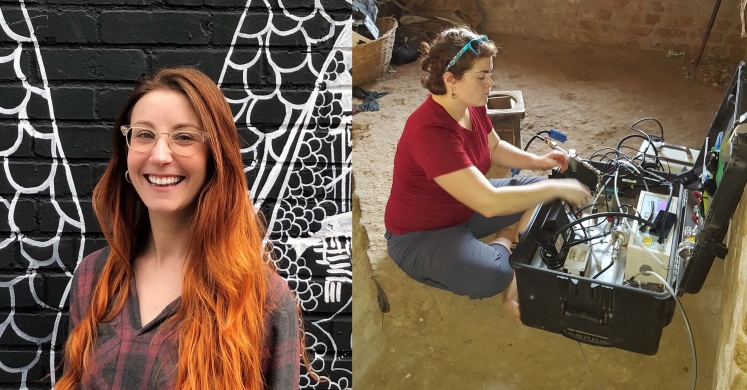Phipps Stories

Meet a Scientist: Lauren Schricker and Rose Eilenberg
All of the researchers featured on our Meet a Scientist Saturdays have received public engagement training through Phipps’ science communication workshops. If you are faculty, post-doc, graduate student or other professional in the sciences and you are interested in the workshop or participating in a Meet a Scientist Saturday, check out our website or email science education outreach manager Dr. Maria Wheeler-Dubas at mwheeler-dubas@phipps.conservatory.org.
This Saturday, come hear from an ecologist who has recorded the calls of a thousand birds and a mechanical engineer who has measured the smoke of a thousand fires! Well, you will have to ask them for those exact numbers and details, but University of Pittsburgh graduate student Lauren Schricker and Carnegie Mellon University graduate student Rose Eilenberg are two accomplished and fascinating women in science conducting work right here in Pittsburgh and they will be in the Tropical Forest this Saturday, August 17, from 1:30-3:30 pm, for Meet a Scientist Saturday! Read interviews with these two scientists below, and on Saturday, come learn all about Lauren’s research that looks at the impact of human activity on biodiversity and Rose’s research which focuses on differences in air quality across the city.
Introduce yourself in 5 sentences or less
Rose: My name is Rose. I'm a 5th-year Ph.D. student at Carnegie Mellon in the Center for Atmospheric Particle Studies. My research focuses on air quality. When I'm not at school I enjoy being involved in the Jewish Community and practicing partner acrobatics.
Lauren: I’m Lauren and I’m a spatial ecologist, meaning I study how and why species are found in some places but not others. I wasn’t always an ecologist though—I have a degree in geology and astronomy, and I’ve also worked as an after school program teacher, managed a bike shop, and as an assistant to an environmental health lawyer. When I’m not doing science, I love to draw, make crafts, and hang out with my pets (I have two tailless cats, a corn snake, and some fish in my aquaponic herb garden)!
Why did you become a scientist?
Rose: I want to know the way things work! I always loved math and science in school, and I wanted to use my skills to make a positive impact. Also, I always dreamed of having an equation named after me!
Lauren: I wasn’t really sure what I wanted to do in college, so I tried out lots of subjects—languages, art, history, and science. I enjoyed them all, but I loved that science was hands-on and that it involved so much learning by doing! I love getting outside and investigating nature to learn something new.
What is the most exciting thing you’ve ever done at work?
Rose: I got to travel to India to measure the emissions from cookstoves! It was a great experience and of course, the food was amazing.
Lauren: When I was in Costa Rica studying leaf cutter ants, I got to spend three days working on a sustainable coffee farm. It sounds like hard work, but it was actually really cool to see how farmers can preserve forests and encourage biodiversity while still growing delicious food that we love and need! I learned about a lot of edible plants there, and it was so fun to be able to walk through the forest and pick food and snack while I worked!
What skills do you use at your job?
Rose: Problem solving and communication are big parts of being a scientist- you have to be able to figure out what's happening when your code won't run, and you have to be able to convey why what you're doing is important.
Lauren: I read—A LOT! I also am learning how to code, which is really important to my job. When I do fieldwork I also use really fun skills like climbing, hiking fast, navigating, identifying plants and animals, and cooking on a campfire. Probably the most important skills I use every day whether I’m in the field or the computer lab are adaptability and problem solving. In science, projects often go wrong or fail, and I always need need to be able to come up with a plan B or C or even Z! Learning that failure okay is really important—science is about testing things to see if they work, and they often don’t, but we learn something from our mistakes every time!
What is your favorite part of your job?
Rose: I love all the smart, interesting people I get to work with. The students in my program come from all over the world.
Lauren: It’s a tie between all the time I get to spend in nature and all the new things I get to constantly learn!
If you weren’t a scientist, what would you be?
Rose: A circus star!
Lauren: I’d be an artist or an art historian! I love art and I make a lot of art in my free time. I paint, embroider, alter my own clothes, and do wood burnings, and I especially love ancient art from around the world.
Why is science outreach important?
Rose: I think science outreach is important to get underrepresented populations, such as women and people of color, in the field of science and engineering. Anyone can be a scientist!
Lauren: Science outreach reminds us why we do science—for the betterment of the community! Plus, outreach fun and rewarding—it feels really good to share our science and see how it can

